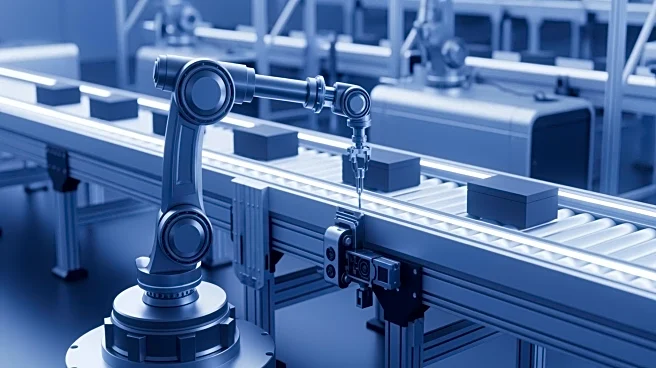What's Happening?
Amazon is reportedly planning to significantly increase its use of robotics and automated technology in its operations, which could lead to a substantial reduction in hiring over the next decade. According
to internal company documents cited by The New York Times, Amazon aims to automate three-quarters of its operations, potentially eliminating the need for hundreds of thousands of new hires. The company anticipates that by 2027, it could avoid hiring 160,000 workers in the U.S., and by 2033, it could curb more than 600,000 hires. This shift is expected to allow Amazon to process more shipments with fewer workers, as seen in a suburban Atlanta distribution center where a robotics overhaul could increase shipment processing by 10% with up to 1,200 fewer employees. Amazon acknowledges the impact of these changes on communities and is considering using terms like 'advanced technology' instead of 'automation' or 'AI' to mitigate concerns.
Why It's Important?
The move towards increased automation by Amazon could have significant implications for the U.S. labor market, particularly in the logistics and warehousing sectors. While automation can lead to increased efficiency and reduced operational costs, it also poses a threat to job creation, potentially making Amazon a net destroyer of jobs. This shift could influence other major companies like Walmart and UPS to adopt similar technologies to remain competitive, further impacting employment in these sectors. The transition to more technical roles may require workers to acquire new skills, potentially widening the gap between available jobs and the workforce's capabilities. Communities reliant on Amazon's employment opportunities may face economic challenges as the company reduces its hiring.
What's Next?
Amazon's strategy to increase automation is likely to prompt discussions among policymakers, labor unions, and industry leaders about the future of work and the need for workforce retraining programs. As automation becomes more prevalent, there may be calls for regulatory measures to ensure fair labor practices and support for displaced workers. The company may also face scrutiny over its impact on local economies and the ethical considerations of reducing human labor in favor of machines. Stakeholders will be watching closely to see how Amazon balances technological advancement with social responsibility.
Beyond the Headlines
The ethical implications of Amazon's automation strategy could spark debates about the role of technology in society and the responsibility of corporations to their employees and communities. The shift towards automation raises questions about the future of work, the value of human labor, and the potential for increased economic inequality. As technology continues to evolve, companies like Amazon may need to address the cultural and social impacts of their business decisions, including the potential loss of traditional job roles and the need for new forms of employment.









